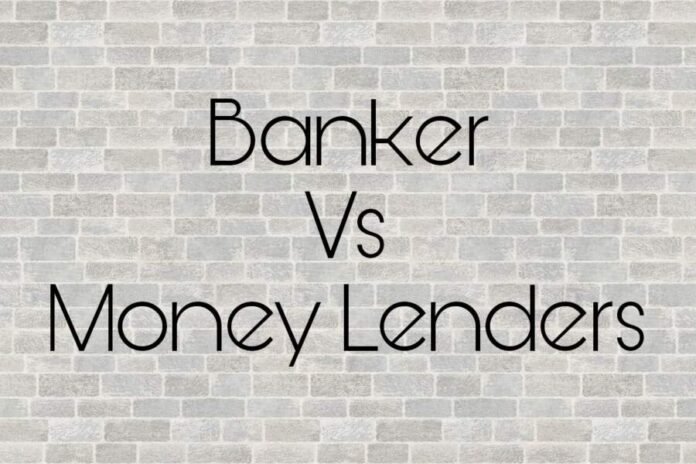Imagine you’re at a crossroads and need to make a decision that could impact your financial future. On one side, you have sturdy and familiar banks; on the other, you have nimble and flexible money lenders. How do you decide which path to take? Buckle up, because this journey through the financial landscape will equip you with the knowledge you need to make that choice!
The Fundamentals
What is a Money Lender?
Think of money lenders as the food trucks of the financial world. They’re smaller, often specialized, and can quickly get you what you need. Money lenders are typically private companies or individuals that offer short-term loans, often without the rigorous checks that banks usually require.
What is a Bank?
In contrast, banks are like fancy restaurants. They have a wide variety of services, from savings accounts to mortgages. Banks are regulated financial institutions that take deposits and use those funds to offer loans.
Key Differences
Lending Criteria
When it comes to lending criteria, banks can be like strict parents. They have stringent credit checks and may require collateral. Money lenders, however, can be more lenient. They might lend to you even if your credit score could be better.
Interest Rates
Picture interest rates like the speed of a car: the higher it is, the more it can cost you. Money lenders tend to have higher interest rates compared to banks. This is because they usually take on riskier loans.
Loan Types
If you’re after various options, banks usually offer a more comprehensive range of loan types, including personal, mortgage, and business loans. Money lenders, on the other hand, are more like a specialized menu, focusing on short-term loans.
Accessibility
Remember when you needed service quickly but got stuck in a bureaucratic maze? Banks can sometimes be like that, with longer processing times. Money lenders often pride themselves on quick and easy access to funds.
Pros and Cons
Advantages of Money Lenders
Money lenders are like your spontaneous friend who’s always up for an adventure. They’re great for when you need cash fast, and they might lend to you despite a low credit score.
Disadvantages of Money Lenders
But there’s always a trade-off. A spontaneous friend might sometimes lead you into precarious situations. Money lenders can have high interest rates and less favorable terms.
Advantages of Banks
Banks are like your wise grandparent who’s been around the block. They offer lower interest rates and a wide range of services. They’re also generally more stable and reliable.
Disadvantages of Banks
However, wisdom can sometimes come with rigidity. Banks can have strict lending criteria and may take longer to process loans.
Making the Decision
Personalized Considerations
So, what’s it going to be? Your decision should hinge on your situation. Need a long-term loan with low interest rates? The bank may be your best bet. Need cash fast and are willing to pay a premium? A licensed moneylender might be the way to go.
Additional Considerations
Now, let’s not get ahead of ourselves! Before making the final call, there are additional considerations to keep in mind:
Repayment Terms
Remember the time you borrowed a book and had to return it? Loans work similarly. Banks usually have more flexible repayment terms, allowing you to pay back over an extended period. Money lenders, however, might require you to pay back much quicker. It’s like choosing between borrowing a library book or one from a friend who needs it back ASAP.
Customer Support
Imagine being stuck in a maze and having someone guide you out. That’s what good customer support feels like. Sometimes, money lenders offer more personalized support due to their smaller size. On the other hand, banks might have more resources but could be less personal.
Financial Planning Assistance
Picture this: You’re on a treasure hunt, but you have a map. That map is financial planning. Banks often have financial experts to help you map your financial future. Money lenders are generally more transactional and may offer something other than this service.
Security
Security is like the lock on your door; you don’t want just anyone getting in. Banks are often perceived as more secure because they are subject to strict regulations. Money lenders may not be as tightly regulated, so you must ensure you deal with a reputable one.
Conclusion
At the end of this financial crossroads, choosing between a money lender and a bank depends on your specific needs, preferences, and circumstances. Weigh the pros and cons, evaluate your options, and choose wisely. Your financial future is worth thought and consideration!
FAQs
- Are money lenders safe?
- Money lenders can be safe if they are reputable and licensed. Always check credentials before proceeding.
- Can I switch from a money lender to a bank?
- Yes, it is possible to switch, especially by refinancing a loan through a bank.
- What should I prioritize: interest rates or lending criteria?
- It depends on your financial situation. If you need fast access to funds, lending criteria might be more critical. Still, for long-term affordability, interest rates are essential.
- Are banks always the better option for large loans?
- Not necessarily. It depends on various factors, including interest rates, credit scores, and loan terms.
- Can money lenders offer better customer service than banks?
- Sometimes, due to their smaller size, money lenders can offer more personalized customer service than banks.
Must Read: Understanding Accredited vs Non-Accredited Investors: A Simple Guide



































































